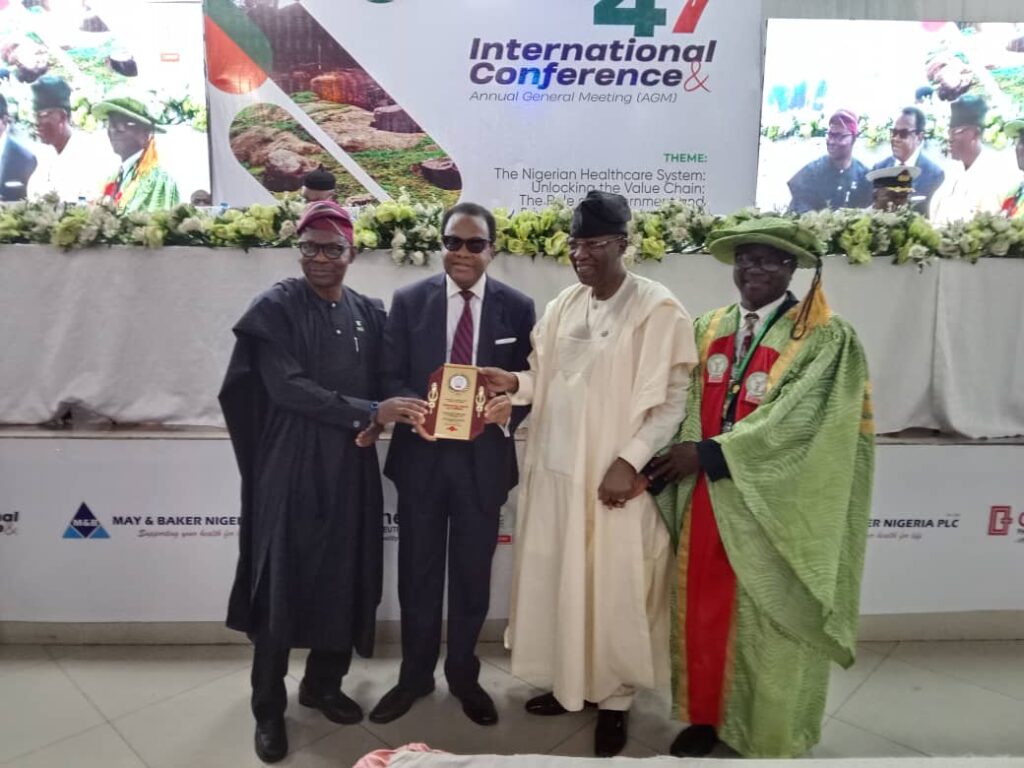Daud Olatunji
In a move aimed at revitalizing Nigeria’s ailing healthcare sector, the Federal Government has unveiled sweeping reforms to unlock the nation’s healthcare value chain and reduce its overdependence on imported medical products.
Speaking on Thursday, as a keynote speaker at the 47th International Conference and Annual General Meeting of the Association of Nigerian Private Medical Practitioners held in Abeokuta, Ogun State, Minister of State for Health and Social Welfare, Dr. Iziaq Salako, disclosed that the government is targeting $5 billion in private healthcare investments and aims to increase local production of health commodities to 70% by 2030.
The conference, themed “Unlocking the Value Chain: The Role of Government and Private Medical Practitioners,” brought together key players from the public and private healthcare sectors to forge a collaborative path toward achieving Universal Health Coverage (UHC).
Salako emphasized that the unlocking of the healthcare value chain is one of the four pillars of the Tinubu administration’s Health Sector Renewal Investment Initiative (NHSRII), alongside effective governance, improved health outcomes, and national health security.
He warned that Nigeria’s continued reliance on imported drugs, vaccines, and medical devices—currently estimated at 70-99%—was unsustainable and posed a threat to national health security.
“The experience of the COVID-19 pandemic taught us hard lessons. We must increase local manufacturing capacity not only for economic reasons but also for national security,” Salako said.
To address this, President Bola Tinubu signed Executive Order 17 in October 2024, eliminating tariffs and excise duties on pharmaceutical machinery and raw materials.
The policy also provides regulatory waivers and incentives to encourage local production. According to Salako, the goal is to reduce Nigeria’s $1–$2 billion annual medical tourism burden and repurpose these funds to strengthen the domestic healthcare infrastructure.
“With the right policies in place, Nigeria can become a regional hub for pharmaceutical manufacturing, medical technology, and health tourism,” Salako asserted.
The Presidential Initiative to Unlock the Healthcare Value Chain (PVAC) has developed an investment pipeline worth over $5 billion, backed by partners like the European Investment Bank, Afreximbank, and the African Development Bank (AfDB). More than 70 bankable projects are being primed for private sector participation, the Minister revealed.
Salako stressed that while the government holds the policy “padlock,” the private sector remains the “key” to unlocking healthcare transformation.
He called on private medical practitioners to look beyond direct patient care and explore investment opportunities across the entire healthcare value chain, including telemedicine, logistics, renewable energy, digital health, and specialist training.
Recognizing the burden placed on private practitioners who continue to serve Nigerians under challenging conditions, the Minister pledged the government’s commitment to creating a more enabling business environment.
He also revealed that a national dialogue on power in the health sector would be held before the end of the second quarter of 2025, with the Association of Nigerian Private Medical Practitioners to be fully involved.
Salako, however, cautioned against prioritizing profit at the expense of access.
“Access to quality healthcare must not become a privilege for a few. I appeal for a pricing model that balances profitability with affordability,” he said, encouraging practitioners to embrace health insurance as a tool for reducing out-of-pocket expenses and expanding care.
The Minister gave an assurance that the Federal Government was committed to long-term reforms, citing improvements in health worker welfare, the revitalization of over 4,000 Primary Healthcare Centres (PHCs), expansion of immunization, and establishment of six world-class cancer centres.
“Healthcare is not just an industry—it’s a national security issue and a pillar of economic growth. Let’s unlock this value chain together,” he said.
Nigeria’s healthcare sector, currently valued at $18 billion, holds immense untapped potential. With concerted efforts between government and the private sector, the country may finally be on the path toward a resilient, self-sufficient, and globally competitive health system.
Earlier in his remarks, the president of the ANPMP, Dr. Kayode Adesola said the theme was timely and crucial.
Adesola stressed the need from a synergy between the governments at all levels and private medical practitioners in the country.
He called for a collaboration to aide efficiency health sector system and facilitate easy and timely attainment of Nigeria’s Universal Health Coverage.
He said “ private medical practitioners remain the chief custodians of healthcare for the Nigerian people .
“Our commitment to service is unwavering and we stand as the closest healthcare providers to the people, ensuring that medical services are always within reach.
“Unlike others we do not engage in strike actions, yet we are often overlooked and underserved in several ways”.
Others who spoke at the AGM and International conference include the former governor of Cross Rivers state, Donald Duke who was the guest speaker of the occasion and former Governor of Ogun State,Senator Gbenga Daniel.
Duke, who spoke on the theme, lamented that development in health sectors and called for reforms and more dedication.
Duke charged the stakeholders to turn the lasting solution to the mass exodus of medical practitioners to salvage the situation the health sector in the country.
Daniel who was the Chairman of the occasion eulogized members of the ANPMP for thoer contributions to the sector.
He called for the need for preferential treatment to the medical practitioners for more efficiency .
Do you want to share a story with us? Do you want to advertise with us? Do you need publicity for a product, service, or event? Contact us on WhatsApp +2348183319097 Email: platformtimes@gmail.com
We are committed to impactful investigative journalism for human interest and social justice. Your donation will help us tell more stories. Kindly donate any amount HERE


